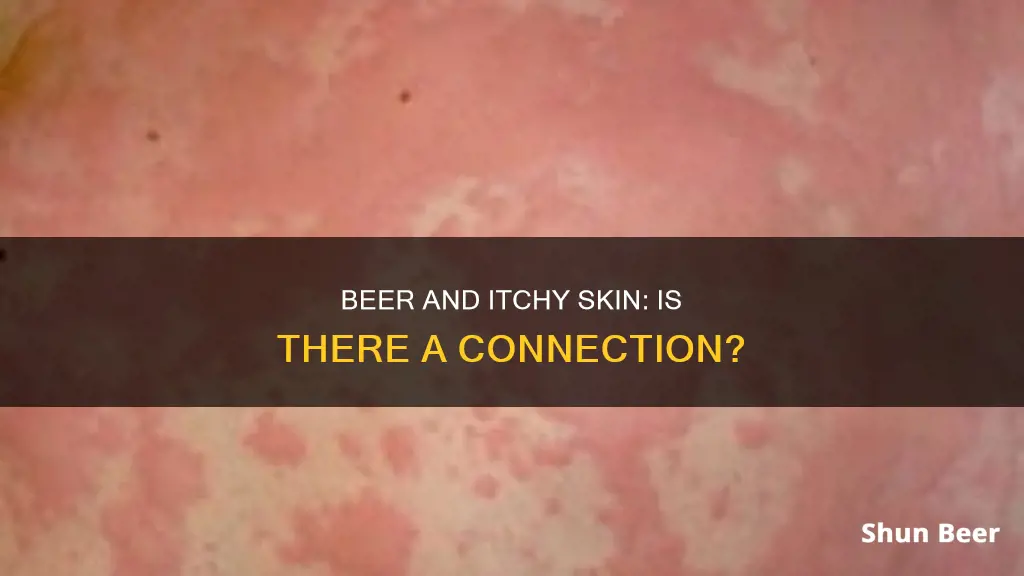
Alcohol can cause skin reactions such as rashes, redness, and itching. While these reactions are uncommon and mostly non-life-threatening, they can be bothersome and uncomfortable. Alcohol-related skin reactions can be caused by various factors, including genetics, alcohol preparation, and pre-existing allergies. In some cases, it is not the alcohol itself but impurities or additives in the alcohol that trigger a reaction. For example, beer contains common allergens such as yeast, hops, barley, and wheat. Additionally, alcohol abuse can lead to liver disease, which may cause skin itching due to the buildup of poorly metabolized substances.
| Characteristics | Values |
|---|---|
| Alcohol allergies rare | True |
| Alcohol intolerance more common | True |
| Alcohol intolerance caused by | Genetic condition that prevents the body from breaking down alcohol efficiently |
| Alcohol intolerance symptoms | Stuffy nose, skin flushing, facial redness, red itchy skin bumps, worsening of asthma, runny nose |
| Alcohol allergy symptoms | Anaphylaxis, rapid weak pulse, nausea, vomiting, difficulty breathing, stomach pain or cramps |
| Alcohol allergy treatment | Avoid alcohol, lie down, take a shot of adrenaline |
What You'll Learn

Beer allergy vs intolerance
Beer allergies are rare, and it is more likely that you have an intolerance to an ingredient in beer. However, it is important to distinguish between a beer allergy and a beer intolerance.
Beer Allergy
A beer allergy is when your body's immune system overreacts to an allergen in beer. The allergen is usually one of the many ingredients in beer, such as barley, gluten, yeast, or wheat. The symptoms of a beer allergy are similar to those of other allergic reactions and can include abdominal pain, bloating, chest tightness, and hives. In rare cases, a beer allergy can cause anaphylaxis, a severe and potentially life-threatening allergic reaction. If you experience any of these symptoms after drinking beer, seek immediate medical attention.
Beer Intolerance
A beer intolerance, on the other hand, is when your digestive system has difficulty with a particular ingredient in beer. This can be due to a genetic condition that affects your body's ability to break down alcohol efficiently, or it could be an intolerance to specific ingredients such as histamine or sulfites. Symptoms of a beer intolerance can include a stuffy nose, skin flushing, hives, and gastrointestinal issues.
Diagnosis and Treatment
If you are experiencing symptoms after drinking beer, it is important to see a healthcare provider to determine the cause. They may perform a physical exam, ask about your medical history, and recommend allergy testing such as a skin test or blood test. The best way to manage a beer allergy or intolerance is to avoid drinking beer or choose beers that do not contain the ingredient causing your symptoms. In some cases, over-the-counter or prescribed medications may help alleviate symptoms.
Beer Drinking: Alcoholism or Harmless Habit?
You may want to see also

Histamine intolerance
The symptoms of histamine intolerance are similar to an allergic reaction and can affect several body systems. The most common symptoms are gastrointestinal issues such as abdominal pain and diarrhoea. Other common symptoms include headaches or migraines, nasal congestion or sinus issues, and an irregular menstrual cycle. In more severe cases, histamine intolerance may cause an irregular heart rate and difficulty regulating body temperature.
The main strategy to manage histamine intolerance is to follow a low-histamine diet, which involves avoiding or limiting foods that are high in histamine. Examples of high-histamine foods include alcohol, fermented foods, processed meat, and aged cheese. In some cases, doctors may also recommend taking antihistamines or DAO supplements to help reduce symptoms.
Mixing Beer and Tylenol: Is it Safe?
You may want to see also

Sulfites intolerance
Sulfites are compounds often added to beer and wine to limit the growth of yeast and act as preservatives. Common sulfites include potassium bisulfite and potassium metabisulfite. Some people have an intolerance or sensitivity to these compounds, and they may experience allergy-like reactions, such as an asthmatic attack. White wine tends to contain higher levels of sulfites than red wine and beer.
If you suspect you have a sulfite intolerance, you should consult a doctor or allergist. They may perform allergy testing, such as a skin prick test or an oral challenge test, to determine the cause of your symptoms.
To prevent uncomfortable reactions, the best course of action is to avoid alcohol or the particular substance that causes your reaction. You can also read beverage labels to identify ingredients or additives that may trigger a response, such as sulfites or certain grains. However, it is important to note that labels might not list all ingredients.
In rare cases, severe pain after drinking alcohol could be a sign of a more serious disorder, such as Hodgkin's lymphoma. Therefore, if you experience serious reactions or severe pain, it is important to seek medical advice.
Drinking Beer with Invisalign: What You Should Know
You may want to see also

Alcohol-induced skin conditions
Alcohol Intolerance
Alcohol intolerance is caused by a genetic condition that prevents the body from breaking down alcohol efficiently. People with East Asian ancestry are more likely to experience alcohol intolerance due to a variant in the gene that codes for aldehyde dehydrogenase (ALDH2), an enzyme responsible for metabolising alcohol. This condition can lead to uncomfortable physical reactions, such as facial redness (flushing), red itchy skin bumps (hives), a runny or stuffy nose, and worsening of pre-existing asthma. Alcohol intolerance can also be triggered by certain ingredients in alcoholic beverages, such as preservatives, grains, or chemicals.
Alcohol Allergy
True alcohol allergy is rare, but it can be severe and even life-threatening. Alcohol allergy occurs when the body's immune system treats alcohol as a harmful intruder and produces antibodies to fight it off, leading to allergic reactions. Common symptoms of an alcohol allergy include anaphylaxis, which involves a rapid weak pulse, nausea, and vomiting. Alcohol allergy can be diagnosed through skin prick tests and blood tests that measure immune system responses to alcohol.
Skin Conditions Induced by Alcohol Consumption
Both alcohol intolerance and allergy can lead to skin conditions such as rashes, itching, hives, and flushing. Additionally, alcohol consumption can trigger underlying skin conditions like rosacea, a common skin condition characterised by redness, stinging, sensitivity, and a burning sensation on the skin. It is important to note that alcohol does not cause rosacea, but it can trigger symptoms in some individuals.
Treatment and Prevention
The most effective way to prevent alcohol-induced skin conditions is to avoid alcohol consumption or limit the amount consumed. In cases of alcohol intolerance, identifying specific types of alcohol or ingredients that trigger reactions can help prevent unpleasant skin reactions. For those with alcohol allergies, carrying epinephrine shots and wearing a medical ID bracelet are crucial to managing potential life-threatening reactions.
Drinking Non-Alcoholic Beer: Is It Safe to Drive?
You may want to see also

Treatment for alcohol-related skin reactions
Alcohol-related skin reactions can be caused by many factors, including genetics, alcohol preparation, and pre-existing allergies. While these reactions are typically not life-threatening, they can be bothersome and uncomfortable. Here are some treatment options for alcohol-related skin reactions:
Avoid Alcohol or Specific Types of Alcohol
The most effective way to prevent alcohol-related skin reactions is to avoid consuming alcohol altogether. This is especially important for individuals with a true alcohol allergy, as even small amounts can trigger a severe reaction. If a particular type of alcohol, such as beer or wine, is identified as the trigger, avoiding that specific type may be sufficient to prevent future reactions.
Over-the-Counter Treatments
For mild allergic reactions, over-the-counter oral antihistamines may be sufficient to manage the symptoms. These can help alleviate itching, redness, and other allergy-related symptoms.
Epinephrine Auto-Injectors
In the case of a severe allergic reaction, such as anaphylaxis, epinephrine auto-injectors (e.g., EpiPen) may be prescribed by a doctor. It is crucial to carry this medication at all times and administer it at the first sign of a severe reaction.
Medical Treatment for Severe Reactions
In more severe cases of alcohol-related skin reactions, immediate medical attention may be required. If the reaction causes swelling of the face, tongue, or throat, it could be a life-threatening situation. Medical intervention is necessary to ensure the person's airway remains open.
Treat Underlying Conditions
For underlying skin conditions that are aggravated by alcohol consumption, such as rosacea, eczema, or psoriasis, it is essential to continue treating these conditions even after abstaining from alcohol. Consult a doctor or dermatologist to determine the best treatment options.
Hydration and Moisturization
Alcohol is a diuretic, which can lead to dehydration and dry skin. To counteract these effects, it is recommended to drink at least eight glasses of water per day, especially when consuming alcohol. Using a moisturizer regularly can also help maintain the skin's moisture barrier.
Seek Professional Help
If you are concerned about your alcohol consumption or are struggling to reduce your intake, it is important to seek professional help. This may involve speaking with a doctor, therapist, or joining a local support group. Treatment programs and rehabilitation centers can provide comprehensive support and guidance throughout your recovery journey.
Drinking Beer on TC: What You Need to Know
You may want to see also
Frequently asked questions
Yes, drinking beer can cause itchy skin. Beer contains common allergens such as yeast, hops, barley, and wheat. Alcoholic beverages are made from complex mixtures of grains, chemicals, and preservatives that the body needs to break down. If your body cannot break these substances down efficiently, you may experience an allergic reaction.
The symptoms of an allergic reaction to beer can include itchy skin, hives, eczema, nasal congestion, wheezing, abdominal pain, nausea, and vomiting. In rare cases, an allergic reaction to beer can be life-threatening and require emergency medical attention.
If you experience an allergic reaction to beer, you should stop drinking it immediately and consult a healthcare professional. To prevent future allergic reactions, it is recommended to avoid drinking beer or any other alcoholic beverages that may contain allergens.







